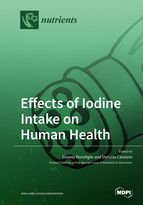Effects of Iodine Intake on Human Health
A special issue of Nutrients (ISSN 2072-6643).
Deadline for manuscript submissions: closed (1 October 2019) | Viewed by 70527
Special Issue Editors
Interests: natural compounds; omega-3 polyunsaturated fatty acid; PPAR gamma; breast cancer; Mediterranean diet; iodine deficiency
Special Issues, Collections and Topics in MDPI journals
Special Issue Information
Dear Colleagues,
Iodine, a key component of thyroid hormones, is considered to be an essential micronutrient for proper health at all life stages. Indeed, an inadequate dietary intake of iodine is responsible for several functional and developmental abnormalities. The most serious consequences of iodine deficiency include hypothyroidism, early abortion, low birth weight, preterm delivery, neuro-cognitive impairment, and mental retardation. On the other hand, the consequences of mild-to-moderate iodine deficiency, such as goiter, are less well understood but represent an important priority for research and public health practice. Over the last several decades, many countries across the globe have introduced mandatory salt iodization programmes, which have dramatically reduced the number of iodine-deficient countries. However, although substantial progress has been made worldwide, mild-to-moderate deficiency is still prevalent even in many developed countries. Thus, the ongoing monitoring of the population iodine status remains crucially important, and attention may need to be paid to vulnerable life stage groups.
This Special Issue of Nutrients entitled “Effects of Iodine Intake on Human Health” welcomes original research and reviews of literature concerning this important topic.
Prof. Dr. Daniela Bonofiglio
Prof. Stefania Catalano
Guest Editors
Manuscript Submission Information
Manuscripts should be submitted online at www.mdpi.com by registering and logging in to this website. Once you are registered, click here to go to the submission form. Manuscripts can be submitted until the deadline. All submissions that pass pre-check are peer-reviewed. Accepted papers will be published continuously in the journal (as soon as accepted) and will be listed together on the special issue website. Research articles, review articles as well as short communications are invited. For planned papers, a title and short abstract (about 100 words) can be sent to the Editorial Office for announcement on this website.
Submitted manuscripts should not have been published previously, nor be under consideration for publication elsewhere (except conference proceedings papers). All manuscripts are thoroughly refereed through a single-blind peer-review process. A guide for authors and other relevant information for submission of manuscripts is available on the Instructions for Authors page. Nutrients is an international peer-reviewed open access semimonthly journal published by MDPI.
Please visit the Instructions for Authors page before submitting a manuscript. The Article Processing Charge (APC) for publication in this open access journal is 2900 CHF (Swiss Francs). Submitted papers should be well formatted and use good English. Authors may use MDPI's English editing service prior to publication or during author revisions.
Keywords
- Dietary iodine intake
- Iodine status
- Iodine deficiency
- Iodine supplementation







